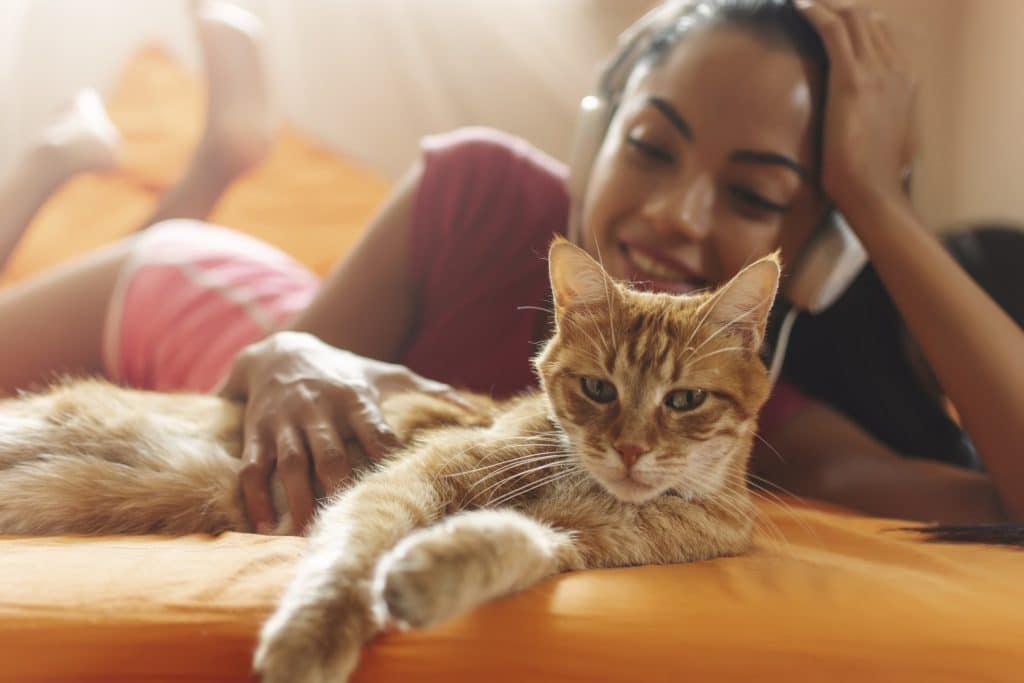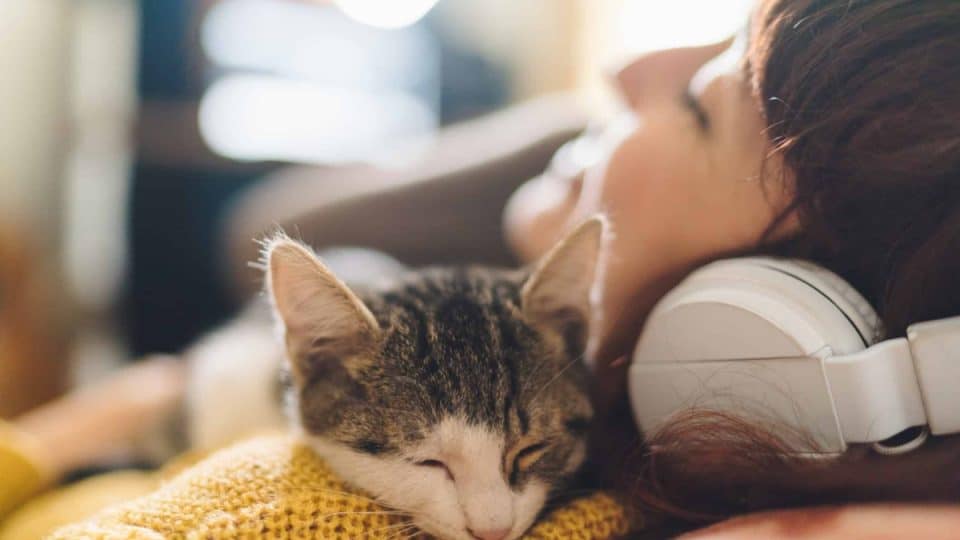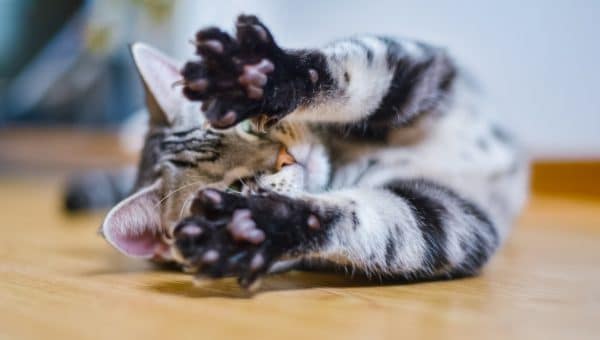- Not a substitute for professional veterinary help.
Have you ever wondered if your cat likes hearing your favorite band as much as you do? Studies say cats respond to the sounds of music but prefer a genre that’s more — in tune with their wild side.
Based on observations, experts think cats prefer natural sounds like running water, the rustling of a breeze, or the tweeting of a bird, says Stephen Quandt, Feline Training and Behavior Specialist and owner of Cat Behavior Help. However, they might also enjoy sounds sharing similar tempos and frequencies as positive cat-to-cat communication vocals like trills, purrs, and mews. When these sounds come together, we call it species-appropriate music for cats.
So, should you play a soothing lullaby of purrs to calm your anxious cat? Maybe, Quandt says. Read on for tips on tuning into your cat’s favorite station. And how do we know if cats like music, anyhow?
How Cats React to Music
Since cats can’t tell us their favorite type of music, researchers played various tunes for cats before, during, and after visiting the vet. During the experiment, some cats visited the vet in silence while others listened to classical or species-appropriate music. In addition, the researchers recorded the cats’ physiological reactions, including their stress levels and willingness to be handled by the veterinarian.
Although typically calming to humans, study cats who listened to classical music showed no significant decrease in stress compared to cats who didn’t listen to music. However, cats who listened to species-appropriate music showed lower stress levels than the rest of the study cats.
Quandt says the study wasn’t a fluke; additional studies show similar results. For example, a study of 46 domestic housecats proved that species-appropriate music makes cats want to get up and — rub their scent on objects. When classical music played, most cats had a neutral reaction and paid no attention to the source of the sound. However, when cat-specific music played, the cats approached the speakers, with some even purring and rubbing against them.

iStock/Linda Raymond
Do cats have a favorite song or artist?
Quandt says cats don’t have a favorite human musician because they respond to music based on its sounds, frequencies, and tempos rather than the associated harmony or human emotions.
For example, cats under anesthesia reacted to pop, classical, and heavy metal music through pupil dilation. This indicates that sounds trigger autonomic nervous system (fight or flight) responses, not emotional reactions.
What Music Do Cats Like?
Cats like species-appropriate music. In other words, the music incorporates sounds they hear in nature and positive communication sounds. Quandt says that loud banging sounds, some extremely low or high frequencies, and fast tempos can distress cats. Likewise, cats might become excited by rustling sounds because it reminds them of hunting.
Cats enjoy music if they’re curious and approach the source of the sound. However, Quandt adds that the best response to music is if your cat falls asleep to it.

iStock/SeventyFour
What Sounds Should I Look For?
Human babies can hear sounds inside the womb, including a muffled mother’s voice, heartbeat, breathing, footsteps, and digestion. It’s thought we retain a comforting connection with sounds like these as we age. Based on this concept, musicians collaborated with scientists to create music using sounds a kitten might have heard in the womb or shortly after birth when forming their first positive associations. These are the most common cat music sounds they’ve discovered.
- Glides and legato notes. Most animals communicate in smooth, continuous vocalizations. So, species-appropriate music typically includes glides and legato notes, which means notes smoothly transition to another without breaks.
- Cat-produced noises. From sucking noises related to kittens nursing to purring, trilling, and mewing, cat-appropriate music includes positive sounds they make when communicating with each other and their humans.
- High-pitched tones and chirping. These sounds capture cats’ attention by mimicking hunting sounds.
- Classical music undertones. This is mainly for us humans when we’re with our cats. “We aren’t very entertained by the sound of continuous purring and rustling of leaves,” Quandt says.
Can I Use Cat Music to Manage My Cat’s Anxiety, Depression, or Stress?
Musicians and animal behavior scientists think species-appropriate music could be useful in veterinary offices, during travel, and even at home when a cat is feeling stressed. One such musician has gone so far as to create an album for his feline friends — his name is David Teie, and you might have heard of his album Music for Cats.
During our interview, Quandt played David Teie’s song “Lolo’s Air,” a peaceful composition of purring, suckling, and chirping sounds entwined with a slow, classical melody. His cat Cricket perked up, looked toward the speaker, and promptly returned to his nap. Sleep is an important way cats combat anxiety, depression, or stress.
“Cats need to sleep a lot, and sounds that promote sleep are helpful,” Quandt says. So, while Cricket’s reaction felt somewhat uneventful, perhaps it’s his favorite song of all. “The bottom line is cats seem to appreciate music, especially music tailored for them,” Quandt says. “Animal shelters often use it, and it should be considered a valuable tool in the world of cat enrichment.”

iStock/Elitsa Deykova
What’s Another Way to Help Cats with Depression or Anxiety?
Because music can mask stressful sounds, it can be an effective tool to calm your cat. Music with positive cat communication sounds may reduce anxiety, stress, or depression. Combined with these other ways to soothe anxiety, music is helpful for your cat’s enrichment and mental well-being.
- Entertaining YouTube videos of birds and fish reduce boredom.
- Feeder toys and puzzles offer treats and exercise your cat’s mind.
- Calming pheromones that mimic cats’ natural scent communication.
- Routine promotes safety and security for your cat.
- Create an enriching environment with cat trees, perches, scratching posts, comfortable beds, and cubbies.
- Bond with your cat through daily play, grooming, and cuddling.
- When planning to be away, hire a cat sitter.
- Maintain low-key departures by avoiding excessive attention and varying your departure routine.
- Ask your veterinarian if anti-anxiety medicine is suitable for your cat.



